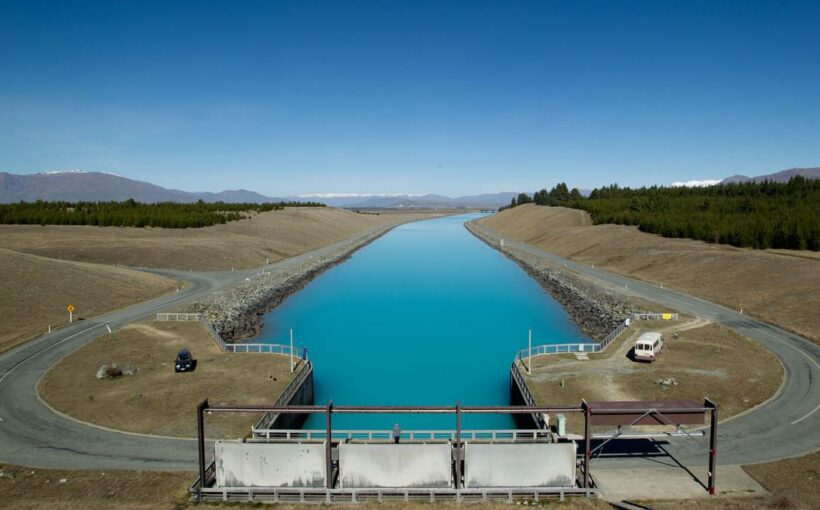Meridian Energy, the electricity generation giant that promotes the fact that its entire generation fleet is renewable, has urged the Government to be tolerant of the ongoing need to use gas to keep the lights on.
On Wednesday Meridian, 51 per cent owned by the Government, released financial results revealing a fall in underlying earnings for the year to June 30, hit by low rainfall into the catchments that feed its many South Island hydroelectricity stations.
READ MORE:
• Low hydro inflows hit Meridian’s cash profits, dividend maintained
The fall in profits came as Meridian – by virtue of the fact that it is New Zealand’s largest electricity company – is at the centre of an intense argument of whether the electricity sector needs major reform.
For months high wholesale electricity prices have led to warnings that much of New Zealand’s industry at risk.
When Transpower forced some regional network companies to instigate rolling blackouts in parts of the North Island on August 9, the issue became a front-page political issue.
Meridian maintains the market is efficient, but the industry was struggling to deal with the first peak demand growth in a decade at a time when all types of fuel were often in short supply.
Chief executive Neal Barclay told investors the “own goal” that led to blackouts on August 9 was a symptom of the struggle of the industry to deliver gas, to effectively provide backup for New Zealand’s already high renewable generation.
Rather than being solved by building more wind farms – Meridian began building Harapaki in Hawke’s Bay earlier this year – Barclay said the intermittency of wind exacerbated the need to have “fast-start” gas-powered electricity to step in when demand threatens to exceed generation.
“I don’t think anyone doubts the importance of reaching a zero-emissions economy, ideally sooner than 2050,” Barclay said.
“But the introduction of the 100 per cent renewable electricity target by 2030 has rapidly upended the wider industry’s long-standing plans to use gas, in particular fast-start gas peakers, to provide renewable firming capacity, and to efficiently transition away from coal,” Barclay told investors.
In time, new technologies would provide other generation that can be switched on as required; Meridian hopes to secure a North Island site to develop an industrial-scale battery before the end of September. But in the meantime, it argues current technologies are needed.
“Some of the renewable firming initiatives being mooted presently are still well over a decade away. So, we do need government policy that is more sympathetic to and accepting of some gas generation.”
The Government needed to refrain from policies that “get in the way” of gas, Barclay said.
He hoped commercial solutions could be found to address the problem, including the possibility of Meridian contracting companies to provide gas peaking capability to ensure new plant was profitable.
In 2018 Prime Minister Jacinda Ardern moved to ban new oil exploration and the Labour Party has set an aspirational target that all electricity generation be renewable by 2030. Numerous bodies – including the Climate Change Commission – have warned of the need for ongoing use of gas to reduce emissions.
This year low rainfall and gas supply shortages have meant that, at times, the Huntly Power Station has been burning thousands of tonnes of coal a day.
While Energy Minister Megan Woods tasked the Electricity Authority with reviewing the drivers of high wholesale electricity prices, there has been little sign Labour sees the need for more gas. In an interview in April, Woods would not say one way or another whether she would welcome more investment in gas.
Meridian has come under attack from smaller retail companies this year and this week faced the releases of an independent report from the Major Electricity Users Group (MEUG) alleging accelerating super profits over the past decade.
Barclay said the way MEUG released the report was “unethical” and the types of analysis could come up with whatever results the authors wanted depending on how they valued the underlying assets.
Meridian reported that earnings before interest, tax, depreciation, amortisation and fair value adjustments dropped $124m to $729m. After years of rising payouts to shareholders, the company held its final dividend at 11.2 cents per share.
“The high prices have been a cause of concern, and no one wants to see them, least of all us. I think people think we’re highly incentivised to see high prices but we’re not. When they turn up, we tend to be short in the market and you can see from our results, it doesn’t necessarily deliver a great outcome.”
Source: Read Full Article

/cloudfront-ap-southeast-2.images.arcpublishing.com/nzme/C3KEFB564J2OND4SXOQ52UMQJU.jpg)